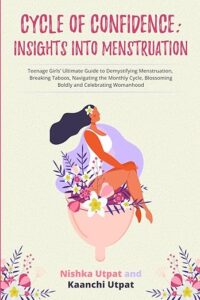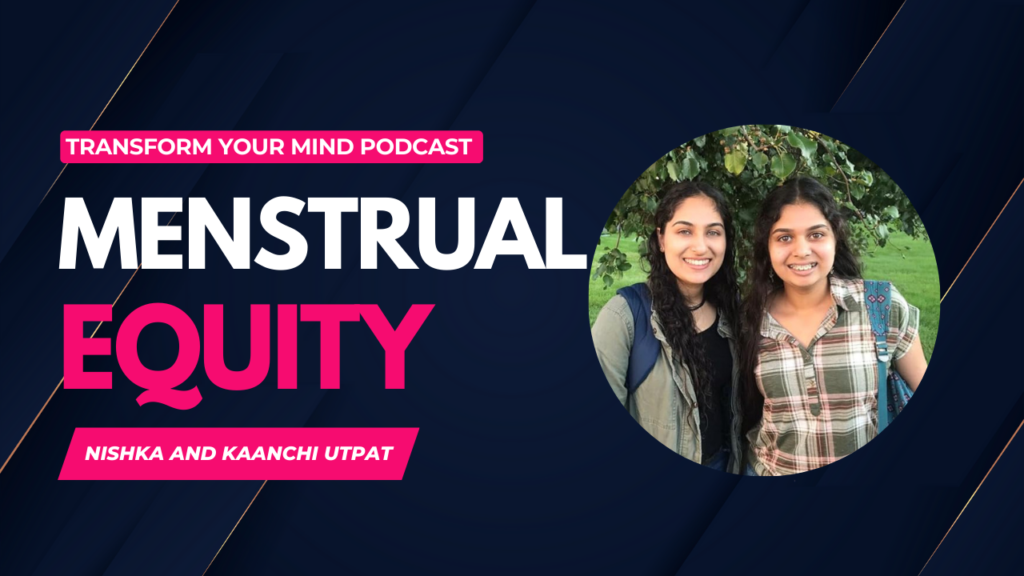Teenage authors Nishka and Kaanchi Utpat delve into the societal and cultural taboos surrounding menstruation in their book, “Cycle of Confidence: Insights into Menstruation.” Inspired by their experiences in India, they aim to normalize conversations about periods, dispel misconceptions, and empower young women through education. They highlight the role of men in this dialogue and share their initiatives to provide sanitary products to girls in Mumbai. Tune in to learn more about their inspiring journey and advocacy for menstrual equity.
Download the podcast here:
Key Takeaways:
Engaging young men in menstrual health discussions can normalize the subject and foster supportive environments.
Cultural stigmas around menstruation are deeply rooted but can be challenged through education and open dialogue.
Empowering women and girls with accurate information promotes dignity and confidence in managing their menstrual health.
Introduction
In a world where menstruation is often viewed as a taboo and shrouded in shame, two remarkable teenage authors, Nishka and Kaanchi Utpat, are courageously breaking the silence. Their book, Cycle of Confidence: Insights Into Menstruation, strives to dispel myths, challenge outdated norms, and empower women and girls by promoting a healthier understanding of menstruation. This transformative work is inspired by their eye-opening experiences during visits to India, where they witnessed the pervasive stigma surrounding menstruation firsthand.
Menstruation Education: A Necessity, Not a Luxury
When it comes to menstruation, lack of proper education remains a pervasive issue, especially in some cultures. Nishka and Kaanchi were astounded by the realization that, in India, many schools don’t include menstruation in their health curriculum. Nishka shares, “We learned that in schools themselves, they don’t even really talk about menstruation at all.” In contrast, here in the United States, children receive formal education on topics like menstruation and sexual health as early as the fourth grade.
Kaanchi elaborates on the potential impact of traditional beliefs: “Different cultures in different countries… the concept is so deeply rooted in the cultures of these lands. So the reasons why people view menstruation as something not to be talked about is simply because of tradition.”
This lack of education often leaves young girls in the dark about their own bodies, creating a breeding ground for fear and misinformation. By including comprehensive menstrual education in school curriculums globally, we can equip young girls with the knowledge they need to manage their cycles with dignity and confidence.
Tackling Menstruation Taboos: Bringing Men into the Conversation
One of the most significant yet overlooked aspects of menstrual health is the exclusion of men from the conversation. The Utpat sisters emphasize the importance of involving boys and men in discussions about menstruation. “A lot of people believe men and boys are meant to be kept out of the conversation of menstruation… if we include the male gender in the discussion of what a period is and what menstruation is, we’re enabling them the chance to help the women in their lives,” says Kaanchi.
This inclusion can start early, in educational settings where both boys and girls receive the same comprehensive health education. “This should be something that we’re able to speak about with each other and all different age groups and all different genders,” Kaanchi adds.
Men who are educated about menstruation are more likely to support the women in their lives, whether as brothers, partners, or friends. This shared understanding can dissolve the stigma and normalize menstruation as a natural biological process. By promoting open dialogue, we can foster a more inclusive environment where menstrual health is no longer a taboo subject.
Empowerment through Education and Advocacy
Education is a powerful tool for change, and it plays a crucial role in the Utpat sisters’ advocacy. Their initiatives go beyond just raising awareness; they also aim to provide practical solutions. Through their nonprofit organization, the Utpat Foundation, they carry out a project called Ami Muli, which stands for Awareness of Menstrual Health Initiative. This project translates to “us girls” in Marathi and focuses on donating sanitary pads to school-aged girls in Mumbai.
Their approach is not just about educating; it’s also about providing tangible support. “We wanted to take it a step further than just talking about it and also be able to do something about the issue,” Kaanchi explains.
By addressing both awareness and access to menstrual health products, the Utpat sisters are helping girls manage their cycles with dignity. This dual approach empowers girls, encouraging them to embrace their menstruation rather than feel ashamed. As Nishka aptly puts it, “Just openly talking about it, openly embracing the subject will really help with the confidence.”

Revisiting the Core of the Menstruation Message
Menstruation is a natural, biological process that half the world’s population experiences. However, cultural stigmas and lack of education continue to hinder open discussions and perpetuate misinformation. By promoting menstrual education in schools and encouraging open dialogues that include boys and men, we can normalize menstruation and dismantle the associated taboos.
Nishka and Kaanchi Utpat’s efforts through their book, podcast, and nonprofit work serve as a beacon of hope and change. They show that through education and advocacy, we can create a world where menstruation is understood, respected, and embraced. As Kaanchi wisely notes, “Knowledge is power.” Let’s use that power to transform our approach to menstrual health, fostering an environment where every girl and woman can manage her cycle with confidence and dignity.









